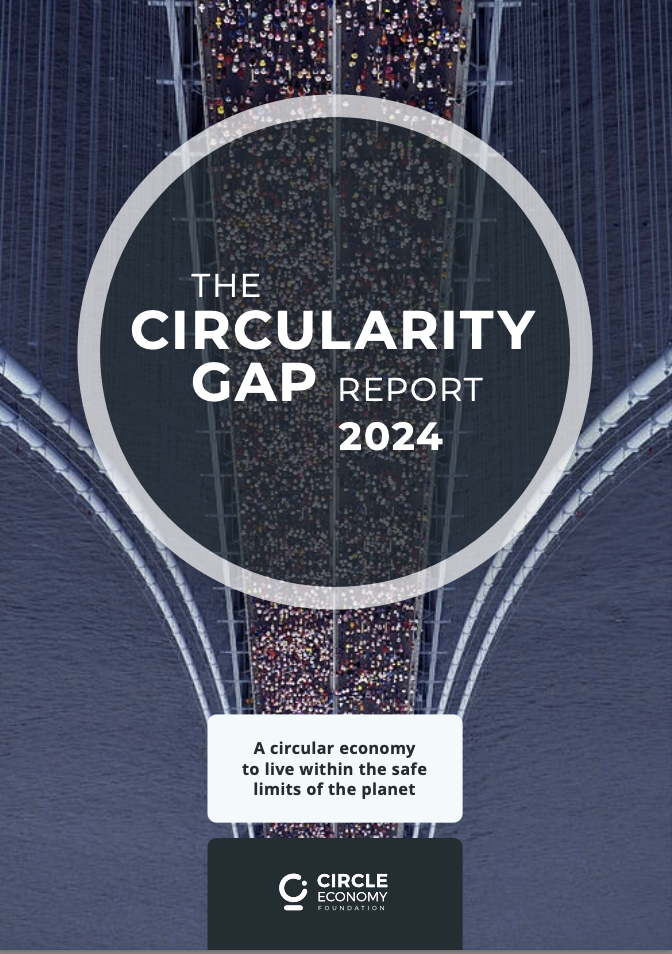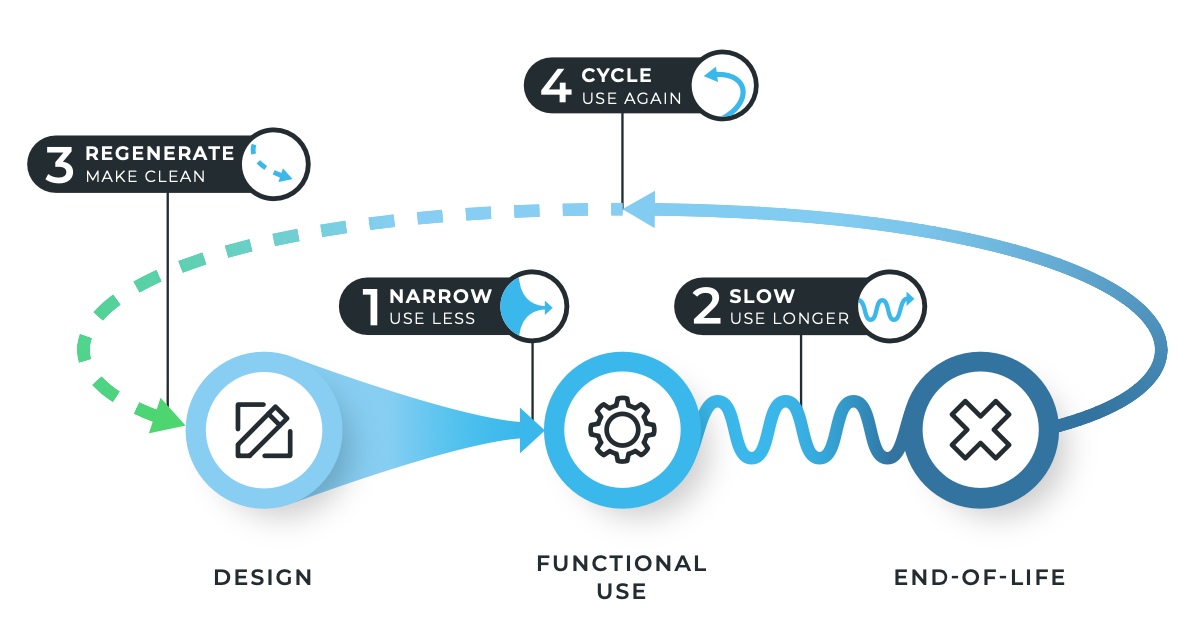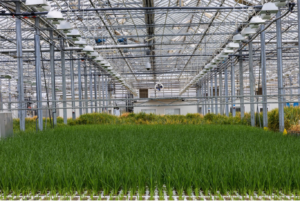Humans are devouring the world’s natural resources at an accelerated pace despite gains in the circular economy, according to a report from the Circle Economy Foundation and Deloitte, released Wednesday. "In just the past six years alone we have consumed over half a trillion tonnes of materials — nearly as much as the entirety of the 20th century," the report says.
However, driving change across three sectors — food, the built environment and manufacturing — can slash by one-third the amount of raw materials needed from nature, according to the nonprofit’s Circularity Gap Report for 2024.
"Tackling the numerous crises we face will require a fundamental shift in economics: We must go from linear to circular to shape an economic system that operates within planetary boundaries," Álvaro Conde Soria, a report author and researcher at the Circle Economy Foundation, said via email.
By 2023, the world's "circularity gap" had risen by 21 percent since 2018 because the consumption of secondary, non-virgin materials dropped from 9.1 percent to 7.2 percent, the Amsterdam-based foundation said. The group’s goal is to double circularity by 2032.

Meanwhile, the linear economy has broken six critical "planetary boundaries": high rates of greenhouse gases; the acidification of the oceans; pollution by nitrogen compounds; phosphorus emissions; atmospheric aerosol releases; and freshwater and land use, the report said.
It called for policies that reward circular practices; fiscal policies that reflect the "true prices" of goods, considering their environmental impacts; and training to empower workers in circular skills.
"Businesses, for example, have a key role to play in this transformation — they’ll need to change their operations and adopt circular business models — but for this to happen, we need a genuinely supportive policy environment, pricing that internalizes environmental and social costs and an underlying just transition mindset that leaves no one behind," Soria said.
The report offered detailed strategies for policymakers and industry leaders to tailor circularity according to the development level of their countries. It grouped countries into three levels of development: industrialized "shift" countries; rapidly developing "grow" countries; or developing "build" ones.
It recommended "radical collaboration" in the following four ways:
1. 'Shift the goalposts' away from GDP
Ensure that materials economies support people’s well being without breaching the limits of natural resources, the report said. One way is to apply indicators beyond GDP to measure human health and equity alongside environmental and economic activities, according to the report. In addition, set new targets, such as capping material use and waste generation until their levels become sustainable.
2. 'Reduce risks for private finance'
Next, leaders must reform the architecture of international finance and trade to enable sustainable development, the report said. "The private sector must be part of the transformation, but reducing risks that attract private finance for development is crucial," the authors wrote. They advocated for increasing affordable access to circular innovations, such as by offering intellectual property rights waivers. Policy leaders should provide debt relief to free up "build" and "grow" nations to invest in the circular economy transition, the report said.
3. 'End incentives for damaging industries'
Next, the authors prescribed fiscal reforms to "realign economic incentives with the objectives of the circular economy to ensure that the private sector and financiers drive and accelerate the transition." This includes redirecting subsidies away from meat, SUVs, fast fashion and air travel, as well as ending incentives for excess consumption by taxing luxury goods to fund public goods such as transportation, parks and healthcare.
4. 'A New Deal for a just transition'
Finally, businesses, labor unions, lawmakers and policy leaders must collaborate to ensure a just transition for people, according to the report. It advocated for a contemporary New Deal governing economic inequality, infrastructure investment, social welfare and sustainability. Just Transition Funds, such as in the EU and U.S., can support transitioning within or away from extractive industries, according to the report, which also urged companies to invest in reskilling workers with "green" skills.

![]()
![]()
![]()
![]()
![]()
The report also listed 12 potential solutions for businesses and consumers to pursue across the three sectors with disproportionate environmental impacts.
- For food systems, the four solutions include shifting diets away from meat and dairy; emphasizing local, seasonal and organic food; mainstreaming regenerative agriculture; and ending food waste.
- In buildings and infrastructure, four policies include making the most of existing structures; using secondary instead of virgin materials; adopting energy efficiency measures; and prioritizing circular approaches, such as modular construction, and materials, such as renewable wood over steel.
- In manufacturing, the suggestions include efficient processes that use less energy and fewer materials; extending the life of equipment and goods; and rejecting regular upgrades of electronics and other gear.
Deloitte and the Circle Economy Foundation also announced last week that they will partner with the Circle Economy Consulting firm, a 2023 spinoff of the foundation, to help organizations accelerate circular economy strategies.
"Successfully piloting and scaling circularity requires close coordination across business functions and supply chains," David Rakowski, a partner at Deloitte UK, said in a statement.
Fifty-five percent of large businesses have made circularity commitments, more than half of which focus on recycling and waste management instead of broader opportunities, according to a Bain & Company report published in September.
- SEO Powered Content & PR Distribution. Get Amplified Today.
- PlatoData.Network Vertical Generative Ai. Empower Yourself. Access Here.
- PlatoAiStream. Web3 Intelligence. Knowledge Amplified. Access Here.
- PlatoESG. Carbon, CleanTech, Energy, Environment, Solar, Waste Management. Access Here.
- PlatoHealth. Biotech and Clinical Trials Intelligence. Access Here.
- Source: https://www.greenbiz.com/article/follow-these-4-tactics-close-worlds-circularity-gap-report-says
- :has
- :is
- $UP
- 1
- 12
- 15%
- 2018
- 2023
- 2024
- 20th
- 7
- 9
- a
- accelerate
- accelerated
- access
- According
- across
- activities
- addition
- adopt
- Adopting
- affordable
- agriculture
- AIR
- air travel
- alone
- alongside
- also
- amount
- an
- and
- and infrastructure
- announced
- Apply
- approaches
- architecture
- ARE
- AS
- At
- atmospheric
- attract
- author
- authors
- away
- Bain
- BE
- because
- become
- behind
- being
- Beyond
- boundaries
- broader
- Broken
- build
- built
- business
- business functions
- businesses
- but
- by
- called
- CAN
- Century
- chains
- change
- Circle
- circular
- circular economy
- click
- Close
- collaborate
- collaboration
- commitments
- Companies
- considering
- construction
- consumed
- Consumers
- consumption
- contemporary
- coordination
- Costs
- countries
- crises
- critical
- crucial
- dairy
- damaging
- data
- deal
- Debt
- deloitte
- Despite
- detailed
- developing
- Development
- disproportionate
- double
- drive
- driving
- dropped
- Economic
- economic system
- Economics
- economies
- economy
- efficiency
- efficient
- Electronics
- Emissions
- emphasizing
- empower
- enable
- end
- ending
- energy
- energy efficiency
- ensure
- entirety
- Environment
- environmental
- equipment
- equity
- Ether (ETH)
- EU
- example
- excess
- existing
- extending
- Face
- Fashion
- FAST
- fewer
- finance
- Firm
- Fiscal
- Flows
- Focus
- follow
- following
- food
- For
- Foundation
- four
- Free
- from
- functions
- fund
- fundamental
- funds
- Gains
- gap
- GDP
- Gear
- generation
- genuinely
- Go
- goal
- goods
- governing
- Green
- Group’s
- Grow
- had
- Half
- happen
- Have
- Health
- healthcare
- help
- High
- HTTPS
- human
- Impacts
- in
- Incentives
- include
- includes
- increasing
- Indicators
- industries
- industry
- Inequality
- Infrastructure
- innovations
- instead
- intellectual
- intellectual property
- International
- into
- Invest
- investment
- IT
- just
- Key
- labor
- Land
- large
- Last
- lawmakers
- leaders
- less
- Level
- levels
- Life
- limits
- linear
- Listed
- local
- Luxury
- made
- mainstreaming
- Making
- management
- manufacturing
- material
- materials
- measure
- measures
- Meat
- Mindset
- models
- modular
- more
- most
- move
- much
- must
- Nations
- Natural
- Nature
- nearly
- Need
- needed
- New
- no
- numerous
- objectives
- oceans
- of
- offered
- offering
- on
- ONE
- One-third
- ones
- operates
- Operations
- opportunities
- or
- organic
- organizations
- Other
- over
- Pace
- parks
- part
- partner
- past
- People
- people’s
- percent
- piloting
- plato
- Plato Data Intelligence
- PlatoData
- Play
- policies
- policy
- policymakers
- Pollution
- potential
- practices
- presentation
- Prices
- pricing
- prioritizing
- private
- private sector
- processes
- property
- Property Rights
- provide
- public
- published
- pursue
- radical
- rapidly
- Rates
- Raw
- recommended
- recycling
- reduce
- reducing
- reflect
- reform
- regenerative
- Regenerative Agriculture
- regular
- released
- Releases
- relief
- Renewable
- report
- require
- requires
- researcher
- reskilling
- Resources
- Reward
- rights
- Risen
- risks
- Role
- s
- Said
- says
- scaling
- seasonal
- secondary
- sector
- Sectors
- September
- set
- Shape
- shift
- SHIFTING
- should
- since
- SIX
- skills
- Social
- Solutions
- Statement
- steel
- strategies
- structures
- Successfully
- such
- supply
- Supply chains
- support
- supportive
- Sustainability
- sustainable
- Sustainable Development
- SUVs
- system
- Systems
- tackling
- tactics
- targets
- than
- that
- The
- the world
- their
- These
- they
- this
- three
- to
- trade
- Training
- Transformation
- transition
- transitioning
- transportation
- travel
- Trillion
- true
- u.s.
- Uk
- underlying
- Unions
- until
- upgrades
- urged
- use
- using
- via
- Virgin
- Waste
- Way..
- ways
- we
- Wednesday
- week
- Welfare
- WELL
- which
- will
- with
- within
- without
- wood
- workers
- world
- world’s
- wrote
- years
- zephyrnet










